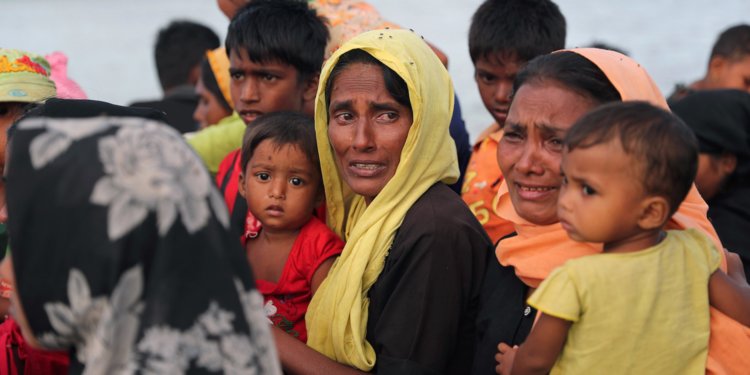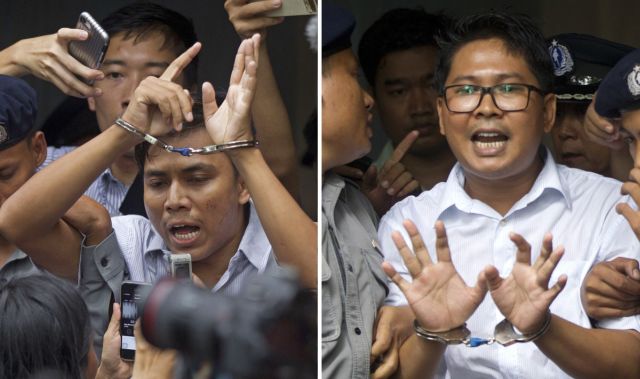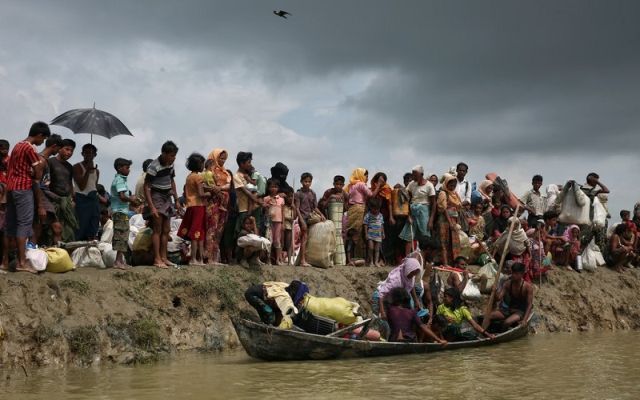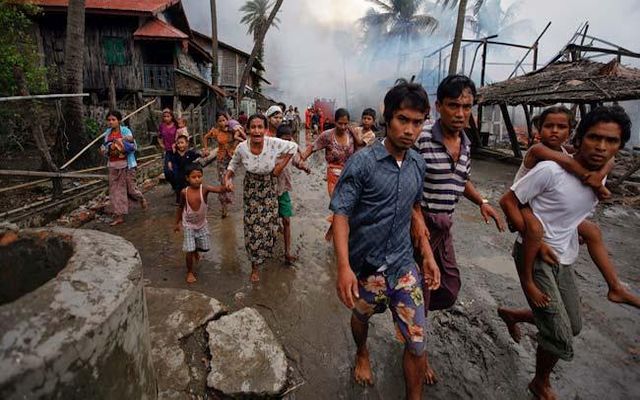
by admin | May 25, 2021 | Muslim World, World

Myanmar : Rohingya remaining in Myanmar’s Rakhine state face a “serious risk of genocide”, UN investigators have said, warning that the repatriation of a million others already driven from the country by the army remains “impossible”.
In a damning report released on Monday, a United Nations fact-finding mission also called for top Myanmar generals, most notably army chief Min Aung Hlaing, to face trial for the killings, gang rape and arson during the Rohingya crackdown.
The mission, set up by the UN’s Human Rights Council in March 2017, doubled down on its findings published last year, in which it had labelled the 2017 crackdown as a “genocide”.
Some 600,000 Rohingya are living in “deplorable” conditions in Rakhine state, subject to restrictions on movement that touch almost every aspect of their lives, the report said.
The factors that “contributed to the killings, rapes and gang rapes, torture, forced displacement and other grave human rights violations” by the Myanmar military and other government authorities are still present, it said.
“Myanmar continues to harbour genocidal intent and the Rohingya remain under serious risk of genocide,” the investigators said in their report, due to be presented to the UN Human Rights Council in Geneva on Tuesday.
Myanmar had repeatedly denied the UN investigators’ 2018 findings and is yet to respond to the latest report.
About 740,00 Rohingya fled from Rakhine to Bangladesh following a crackdown by the government forces and other groups that began in August 2017.
The fleeing Rohingya, who alleged rape, murder and torture, joined about 300,000 Rohingya living in southern Bangladesh, which now hosts the largest refugee camp in the world.
While the predominantly Muslim Rohingya have lived in Myanmar for decades, the government views them as “illegal immigrants”. A 1982 law denied citizenship to them, effectively rendering them stateless.

by admin | May 25, 2021 | World
 Yangon : Two Reuters journalists sentenced to seven years in prison for violating Myanmar’s Official Secrets Act while investigating the killing of Rohingya in the country lodged an appeal on Monday.
Yangon : Two Reuters journalists sentenced to seven years in prison for violating Myanmar’s Official Secrets Act while investigating the killing of Rohingya in the country lodged an appeal on Monday.
Than Zaw Aung, a defence lawyer representing the two Myanmar journalists Wa Lone, 32, and Kyaw Soe Oo, 28, told Efe news that he filed the appeal at the Yangon’s High Court.
According to the lawyer, the journalists have a chance of being released by the court, although he did not rule out going to the Supreme Court if the verdict issued on September 3 is maintained.
The president and editor-in-chief of Reuters, Stephen J. Adler, said in a statement that “in condemning them as spies, it ignored compelling evidence of a police set-up, serious due process violations, and the prosecution’s failure to prove any of the key elements of the crime”,
Adler also urged Myanmar “to uphold its stated dedication to rule of law, freedom of the press, and democracy by ordering the release of our colleagues”,
Wa Lone and Kyaw Soe Oo were arrested on the night of December 12, 2017, in possession of confidential documents which, according to them, had just been handed over by two police officers whom they had met.
The reporters were investigating a massacre of the Rohingya minority in the village of Inn Dinn in Rakhine state.
Authorities accused them both, under the colonial-era Official Secrets Act, of having obtained secret documents about the military operation in Rakhine, which the Burmese army had launched following the series of attacks by an insurgent Rohingya group against border posts on August 25, 2017.
Around 725,000 Rohingya fled to Bangladesh following the violent military offensive in which UN investigators found elements of genocide, crimes against humanity and war crimes.
—IANS

by admin | May 25, 2021 | World
 By Arul Louis,
By Arul Louis,
United Nations : After China and Russia failed to block a briefing on Myanmar, the Security Council heard the head of an independent investigation into alleged atrocities against the Rohingya calling for prosecuting senior leaders of national forces on charges of genocide.
The Chair of the Independent International Fact-Finding Mission on Myanmar set up by the Human Rights Council, Marzuki Darusman, said that they had found evidence of war crimes and crimes against humanity and asked the Council to refer the matter to the International Criminal Court or create an international criminal tribunal to prosecute those responsible.
Before he was allowed to speak, China and Russia objected to the briefing saying it would only complicate matters and make a resolution of the Rohingya crisis difficult.
Russian’s Permanent representative Vassily Nebenzia dismissed the report as “raw” and unreliable and pointed out that the US, which was now backing the mission, had withdrawn from the Human Rights Council questioning its objectivity.
In the procedural vote, where permanent members do not have veto powers, the Council decided with nine votes in favour, three abstentions and three – China, Russia and Bolivia – against to to hold the briefing.
The vote was an illustration of the discord at the Security Council that hobbles it effectiveness in dealing with many crises.
Backing the call for prosecutions, US Permanent representative Nikki Haley said: “Only accountability for the crimes against Rohingya will serve the cause of peace in Burma. This is not about finger pointing. It is about accepting the realities of what happened so that healing and accountability can occur.”
Bangladesh Permanent Representative Masud Bin Momen backed the fact-finding mission’s report and said that Council should act on it.
He offered his country’s assistance for international prosecution of those responsible for the crimes against the Rohigya.
Myanmar’s Permanent Representative Hau Do Suan said that his country’s security forces carried out legitimate counter-terrorist actions and these were done without “genocidal intent”.
The Rohingya crisis was precipated by attacks by Arakan Rohingya Salvation Army terrorist group against 30 police outposts and a military installation, and hundreds of innocent civilians, including Hindus, other ethnic minorities and Muslims supporting the government were massacred by the group.
The Myanmar government has established an independent commission of inquiry to go into allegations of human rights violations and had already taken action some of the military, police and national security officers.
China’s Permanent Representative Ma Zhaoxu came out in support of Myanmar saying that it was making progress in resolving the Rohingya issue by trying to implement agreements regarding their return and allowing UN agencies access.
At the same time, he praised Bangladesh for hosting the refugees and said Beijing was helping it and Myanmar deal with the crisis.
In meeting facilitated by his country, Ma said Myanmar had agreed to a timetable for the return of refugees.
(Arul Louis can be reached at arul.l@ians.in and followed on Twitter @arulouis)
—IANS

by admin | May 25, 2021 | World
 Nay Pyi Taw : The non-profit Human Rights Watch on Friday urged the Myanmar government to stop the demolition of villages abandoned by the Rohingya minority in Rakhine state from where almost 700,000 members of the community have fled to Bangladesh.
Nay Pyi Taw : The non-profit Human Rights Watch on Friday urged the Myanmar government to stop the demolition of villages abandoned by the Rohingya minority in Rakhine state from where almost 700,000 members of the community have fled to Bangladesh.
HRW said satellite images revealed that the government has bulldozed dozens of Rohingya settlements and added that they should be preserved as “crime scenes” to investigate allegations of atrocities against the military, reports the BBC.
“Many of these villages were scenes of atrocities against Rohingya and should be preserved so that the experts appointed by the UN to document these abuses can properly evaluate the evidence to identify those responsible,” said Brad Adams, Asia Director, HRW.
“Bulldozing these areas threatens to erase both the memory and the legal claims of the Rohingya who lived there,” he added.
The Rohingya exodus started after August 25, 2017, when the military carried out a campaign in retaliation for attacks by a Rohingya rebel group on multiple government posts.
According to the HRW statement, since late 2017, authorities have used heavy machinery to clear at least 55 villages of all structures and at least two of the demolished villages were previously undamaged.
Between January 9 and February 13, bulldozers razed two settlements in the village of Myin Hlut that appeared intact in images from November 2017, the non-profit said.
“Deliberately demolishing villages to destroy evidence of grave crimes is obstruction of justice,” said Adams.
HRW said that 362 Rohingya villages had already been completely or partially razed during the military campaign last year.
The repatriation of Rohingya refugees, numbering around 688,000, should have began within two months of November 23, 2017 – when an accord between Bangladesh and Myanmar was signed – but Bangladesh decided to postpone the process in January.
The non-profit has demanded that representatives of the UN be given access to Rakhine to study the allegations the army committed murder, rape and other crimes.
—IANS

by admin | May 25, 2021 | Muslim World
 Yangon : At least 71 people have been killed in the latest fighting between Rohingya Muslims and Myanmar security forces in the country’s Rakhine state, the office of de facto leader Aung San Suu Kyi said Friday.
Yangon : At least 71 people have been killed in the latest fighting between Rohingya Muslims and Myanmar security forces in the country’s Rakhine state, the office of de facto leader Aung San Suu Kyi said Friday.
In an updated toll, the State Counsellor’s office said 12 security officials had been killed and that “59 dead bodies of extremist Bengali terrorists” had been found — the phrase Myanmar authorities use to describe Rohingya militants. The fighting — still going on in some areas — marked a major escalation in a simmering conflict in the northwestern state since last October, when similar attacks prompted a big military sweep beset by allegations of serious human rights abuses, Reuters reported.
The Arakan Rohingya Salvation Army (ARSA), a group previously known as Harakah Al-Yaqin, or “Faith Movement,” which instigated the October attacks, claimed responsibility for the early morning offensive, and warned of more attacks. The treatment of approximately 1.1 million Muslim Rohingya has emerged as majority Buddhist Myanmar’s most contentious human rights issue as it makes a transition from decades of harsh military rule. It now appears to have spawned a potent insurgency, which has grown in size and morphed from an militant group into something more akin to a widespread movement, observers say.
The situation in the state deteriorated early this month when security forces began a new “clearance operation” in a remote mountain area. The army earlier said that one soldier, 10 police and 21 insurgents had been killed in the attacks. Two military sources contacted by Reuters said there may be more deaths. “In the early morning at 1 a.m., the extremist Bengali insurgents started their attack on the police post … with the man-made bombs and small weapons,” said the army, referring to the Rohingya with the derogatory term implying they are interlopers from Bangladesh.
It added the militants also used sticks and swords and destroyed bridges with explosives. Further attacks came at around 3 a.m. and 4 a.m., it said. The Rohingya are denied citizenship and are seen by many in Myanmar as illegal immigrants from Bangladesh, despite claiming roots in the region that go back centuries, with communities marginalized and occasionally subjected to communal violence. The military counter-offensive in October resulted in some 87,000 Rohingya fleeing to Bangladesh, where they joined many others who have fled from Myanmar over the past two decades or more.
The United Nations said Myanmar’s security forces likely committed crimes against humanity in the offensive that began in October. The military said about 150 Rohingya attacked an army base in Taung Bazar village in Buthidaung township, prompting the army to fight back. “They were planning to attack because we have found their camps, the caves and the bombs and masks inside the caves,” said Myanmar police spokesman Col. Myo Thu Soe.
The morning attack took place hours after a panel led by the former UN chief Kofi Annan advised the government on long-term solutions for the violence-riven state. Annan condemned the violence on Friday, saying that the “alleged scale and gravity of these attacks mark a worrying escalation of violence. No cause can justify such brutality and senseless killing.”
Military sources in Rakhine told Reuters they estimated the number of insurgents in the offensive stood at about 1,000 and that it encompassed both Maungdaw and Buthidaung townships — a much wider area compared with October. The leader of ARSA, Ata Ullah, has said hundreds of young Rohingya have joined the group, which claims to be waging a legitimate defense against the army and for human rights. “We have been taking our defensive actions against the Burmese marauding forces in more than 25 different places across the region. More soon!” the group said on a Twitter account believed to be linked to it.
Over the last several months the government has accused the insurgents of instigating a campaign of terror against village chiefs and killing government informers, disrupting government information networks. “The insurgents were able to organize such a huge attack because they were successful in organizing the information blackout,” said one of the military sources. “It’s an extremely serious situation which could lead to a major crisis. It’s not easy to know what has happened, but it’s clearly very worrying,” said Yangon-based analyst and former UN diplomat in Myanmar Richard Horsey. Bangladesh pushed back around 146 Rohingya trying to flee following the violence, S.M. Ariful Islam, a Border Guard Bangladesh officer, told Reuters.
Amid rising tensions over the past few weeks, more than 1,000 new refugees have fled to Bangladesh. “My cousin in our village back in northern Maungdaw told me about rising tensions there. Military is everywhere. People are crying, mourning the dead,” said Mohammed Shafi, who lives in a Rohingya refugee camp in Bangladesh near the Myanmar border. “This morning we had a prayer meeting in the Kutupalong refugee camp for the victims and for the wellbeing of our homeland. Things are turning real bad. It’s scary.”
—HA/IINA





